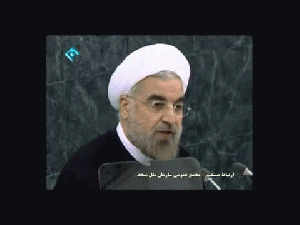Hassan Rouhani Speech at United Nations by YouTube
The United States has chosen for decades to close their collective ears to the words of the leaders of Iran. George W. Bush refused to negotiate with terrorists; he refused to dialogue and diplomacy. He shut his ear to Iran, and to other nations, on the premise that any communication would elevate the status of those nations in the world.
It may have been surprising to many that our current president, Barack Obama, in a non-typical gesture, allowed the American delegation to walk out on the occasion of Mahmoud Ahmadinejad's speech to the United Nations last year. Pundits had supposed he would be belligerent and threatening; in fact he was wise, thoughtful, and revealing in his words. The American delegation had to read the news coverage, to appreciate the speaking of Ahmadinejad.
As Ahmadinejad's term of office came to an end, as Iranian law allows, his successor H. E. Dr. Hassan Rouhani, President of the Islamic Republic of Iran, took the global stage. Rouhani, aware that the Iranian people were frightened of the prospect of war, and weary of sanctions placed by the world powers, took a stance that would end their fear and restraints, and by doing so, won a democratic election.
Now the world wonders at the sincerity of Iran as that nation undertakes to work with the nations of the world, and end the threats to Palestine, and the threat of a nuclear powered nation in that unstable region.
In his initial address to the Sixty-eight Session of the United Nations General Assembly, Rouhani spoke to the subject of propaganda; the preponderance of threats to global peace, made by his predecessor, that were designed we might believe to capture the emotion of the Iranian people, but not to be accepted as dogmatic policy by the rest of the world. At the same time he stresses that nation leaders have an inherent right to defend their regimes, and to, within limits, operate their areas of domination as needs require.
The impact of violent and extremist narratives should not - in fact, must not - be underestimated. In this context, the strategic violence, which is manifested in the efforts to deprive regional players from their natural domain of action, containment policies, regime change from outside, and the efforts towards redrawing of political borders and frontiers, is extremely dangerous and provocative.
In his speaking, Rouhani referred to the ongoing and, in his words, archaic, policies of some to resort to threats, and militarism to maintain superiority.
A few actors still tend to rely on archaic and deeply ineffective ways and means to preserve their old superiority and domination. Militarism and the recourse to violent and military means to subjugate others are failed examples of the perpetuation of old ways in new circumstances.
The new Iranian president went on to a main thrust of his address; the human tenancy to fear the unknown, and those things we don't understand. He included the perceived fear the world has on Iran and it's nuclear policies.
(Note: You can view every article as one long page if you sign up as an Advocate Member, or higher).






